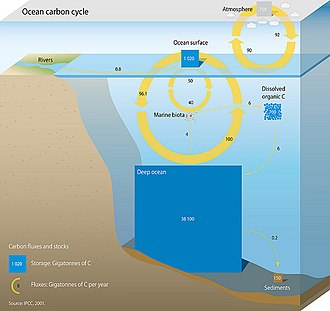Oceanic carbon cycle


Oceanic Carbon Cycle
The Oceanic Carbon Cycle is a fundamental component of the Earth's global carbon cycle, which describes the movement of carbon atoms through the Earth's oceans. It plays a critical role in regulating the Earth's climate by absorbing, storing, and releasing carbon dioxide (CO2), a major greenhouse gas. The oceanic carbon cycle is a complex system involving various processes and interactions among the ocean's physical, chemical, and biological components.
Overview[edit]
The oceanic carbon cycle consists of several key processes that transfer carbon in various forms across different parts of the ocean and the atmosphere. These processes include photosynthesis, respiration, calcification, and the formation and dissolution of carbonate minerals. The cycle can be divided into two main components: the biological pump and the solubility pump.
Biological Pump[edit]
The biological pump refers to the process by which phytoplankton, microscopic plant-like organisms in the ocean, absorb CO2 from the atmosphere during photosynthesis to produce energy and build cellular structures. When phytoplankton die or are consumed by other organisms, a portion of the carbon they have assimilated sinks deeper into the ocean as part of their remains or fecal pellets. This process effectively removes carbon from the surface ocean and atmosphere, storing it in deep ocean waters and sediments for varying lengths of time.
Solubility Pump[edit]
The solubility pump is driven by the physical and chemical properties of seawater, which affect CO2's solubility. Colder water temperatures and higher pressures, common in deeper ocean layers, increase CO2's solubility, allowing the deep ocean to store large amounts of carbon. The ocean's circulation patterns, including thermohaline circulation, play a crucial role in transporting CO2-rich waters from the surface to the deep ocean and vice versa, further influencing the global carbon cycle.
Carbon Sequestration[edit]
A significant aspect of the oceanic carbon cycle is carbon sequestration, the long-term storage of carbon in the ocean's interior and sediments. This process helps mitigate the impact of anthropogenic CO2 emissions on the climate. However, the increasing concentration of CO2 in the atmosphere due to human activities is leading to higher levels of dissolved CO2 in the ocean, causing ocean acidification, which poses a threat to marine life, particularly organisms that rely on calcium carbonate for their skeletal structures, such as corals and shellfish.
Climate Change Impacts[edit]
The oceanic carbon cycle is both influenced by and influences climate change. Changes in ocean temperature, circulation, and chemistry can alter the efficiency of carbon uptake and storage, potentially leading to feedback mechanisms that could either amplify or mitigate climate change. Understanding the oceanic carbon cycle is crucial for predicting future climate scenarios and developing strategies to reduce CO2 emissions and their impacts on the climate.
Research and Monitoring[edit]
Ongoing research and monitoring efforts are essential for improving our understanding of the oceanic carbon cycle. Programs such as the International Geosphere-Biosphere Programme (IGBP) and the Global Ocean Observing System (GOOS) contribute to this understanding by collecting and analyzing data on ocean chemistry, biology, and physical processes. These efforts help scientists model the oceanic carbon cycle more accurately and predict how it may change in the future.
Ad. Transform your life with W8MD's Budget GLP-1 injections from $75


W8MD offers a medical weight loss program to lose weight in Philadelphia. Our physician-supervised medical weight loss provides:
- Weight loss injections in NYC (generic and brand names):
- Zepbound / Mounjaro, Wegovy / Ozempic, Saxenda
- Most insurances accepted or discounted self-pay rates. We will obtain insurance prior authorizations if needed.
- Generic GLP1 weight loss injections from $75 for the starting dose.
- Also offer prescription weight loss medications including Phentermine, Qsymia, Diethylpropion, Contrave etc.
NYC weight loss doctor appointmentsNYC weight loss doctor appointments
Start your NYC weight loss journey today at our NYC medical weight loss and Philadelphia medical weight loss clinics.
- Call 718-946-5500 to lose weight in NYC or for medical weight loss in Philadelphia 215-676-2334.
- Tags:NYC medical weight loss, Philadelphia lose weight Zepbound NYC, Budget GLP1 weight loss injections, Wegovy Philadelphia, Wegovy NYC, Philadelphia medical weight loss, Brookly weight loss and Wegovy NYC
|
WikiMD's Wellness Encyclopedia |
| Let Food Be Thy Medicine Medicine Thy Food - Hippocrates |
Medical Disclaimer: WikiMD is not a substitute for professional medical advice. The information on WikiMD is provided as an information resource only, may be incorrect, outdated or misleading, and is not to be used or relied on for any diagnostic or treatment purposes. Please consult your health care provider before making any healthcare decisions or for guidance about a specific medical condition. WikiMD expressly disclaims responsibility, and shall have no liability, for any damages, loss, injury, or liability whatsoever suffered as a result of your reliance on the information contained in this site. By visiting this site you agree to the foregoing terms and conditions, which may from time to time be changed or supplemented by WikiMD. If you do not agree to the foregoing terms and conditions, you should not enter or use this site. See full disclaimer.
Credits:Most images are courtesy of Wikimedia commons, and templates, categories Wikipedia, licensed under CC BY SA or similar.
Translate this page: - East Asian
中文,
日本,
한국어,
South Asian
हिन्दी,
தமிழ்,
తెలుగు,
Urdu,
ಕನ್ನಡ,
Southeast Asian
Indonesian,
Vietnamese,
Thai,
မြန်မာဘာသာ,
বাংলা
European
español,
Deutsch,
français,
Greek,
português do Brasil,
polski,
română,
русский,
Nederlands,
norsk,
svenska,
suomi,
Italian
Middle Eastern & African
عربى,
Turkish,
Persian,
Hebrew,
Afrikaans,
isiZulu,
Kiswahili,
Other
Bulgarian,
Hungarian,
Czech,
Swedish,
മലയാളം,
मराठी,
ਪੰਜਾਬੀ,
ગુજરાતી,
Portuguese,
Ukrainian